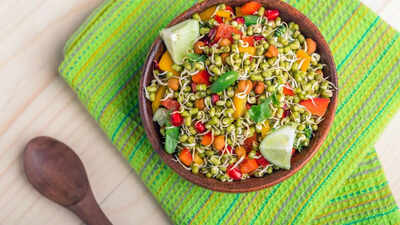Health
Discover the Nutritional Power of Sprouts: Benefits and Risks

Sprouts have emerged as a popular nutritional option, packed with essential vitamins and minerals. Common varieties include mung beans, lentils, and alfalfa, which are not only flavorful but also contribute significantly to a balanced diet. These germinated seeds offer an impressive array of benefits, supporting immunity, digestion, and overall health. However, consumers must also be aware of the potential risks associated with their raw consumption.
Understanding the Nutritional Benefits of Sprouts
Sprouts are often referred to as nutritional powerhouses. According to a study published by the National Institutes of Health, these tiny seeds are abundant in vitamins such as vitamin C, vitamin A, and vitamin K. These vitamins play crucial roles in bolstering the immune system and promoting overall health. Additionally, sprouts contain vital minerals like iron, calcium, and magnesium, which are essential for energy production, bone health, and effective circulation.
Beyond vitamins and minerals, sprouts are a source of plant-based protein, aiding in muscle repair, and are rich in dietary fiber, which supports healthy digestion. Regular inclusion of sprouts in meals can enhance metabolism and provide an energy boost throughout the day.
Recognizing the Risks of Consuming Raw Sprouts
Despite their numerous health benefits, raw sprouts can pose risks if not properly handled. The environment required for sprouting—warm and humid—can promote the growth of harmful bacteria, including E. coli and Salmonella. A study conducted by Colorado State University indicates that consuming contaminated sprouts may lead to gastrointestinal issues, such as nausea, diarrhea, and stomach cramps. Vulnerable populations, including individuals with weakened immune systems, pregnant women, older adults, and young children, should exercise particular caution when consuming raw sprouts.
To minimize these risks, it is crucial to follow safe consumption practices. Thoroughly rinsing sprouts before eating and storing them in the refrigerator can help reduce the likelihood of contamination. Lightly cooking sprouts—whether by steaming or sautéing—further decreases this risk, making them a safer addition to your meals.
Growing Sprouts at Home for Safety and Freshness
For those interested in enjoying sprouts without the concern of contamination, growing them at home is a viable option. The process is straightforward: soak the seeds for 8 to 12 hours, then drain and rinse them. Place the seeds in a sprouting jar or tray, rinsing them 2 to 3 times a day. Depending on the type of sprout, they can be harvested in 2 to 7 days. Home-grown sprouts not only offer freshness but also allow individuals to maintain control over hygiene practices, ensuring a safe and nutritious food source.
In conclusion, sprouts are a versatile and beneficial addition to a health-conscious diet, providing numerous nutritional advantages. However, understanding the risks associated with their consumption is essential. By recognizing their health benefits, adopting safe handling practices, and considering home cultivation, individuals can enjoy the advantages of this superfood while keeping health concerns at bay.
Disclaimer: This article serves as general information and is not a substitute for professional medical advice, diagnosis, or treatment. Always consult a qualified healthcare provider regarding any medical condition or lifestyle change.
-

 World5 months ago
World5 months agoSBI Announces QIP Floor Price at ₹811.05 Per Share
-

 Lifestyle5 months ago
Lifestyle5 months agoCept Unveils ₹3.1 Crore Urban Mobility Plan for Sustainable Growth
-

 Science4 months ago
Science4 months agoNew Blood Group Discovered in South Indian Woman at Rotary Centre
-

 World5 months ago
World5 months agoTorrential Rains Cause Flash Flooding in New York and New Jersey
-

 Top Stories5 months ago
Top Stories5 months agoKonkani Cultural Organisation to Host Pearl Jubilee in Abu Dhabi
-

 Sports4 months ago
Sports4 months agoBroad Advocates for Bowling Change Ahead of Final Test Against India
-

 Science5 months ago
Science5 months agoNothing Headphone 1 Review: A Bold Contender in Audio Design
-

 Top Stories5 months ago
Top Stories5 months agoAir India Crash Investigation Highlights Boeing Fuel Switch Concerns
-

 Business5 months ago
Business5 months agoIndian Stock Market Rebounds: Sensex and Nifty Rise After Four-Day Decline
-

 Sports4 months ago
Sports4 months agoCristian Totti Retires at 19: Pressure of Fame Takes Toll
-

 Politics5 months ago
Politics5 months agoAbandoned Doberman Finds New Home After Journey to Prague
-

 Top Stories5 months ago
Top Stories5 months agoPatna Bank Manager Abhishek Varun Found Dead in Well









